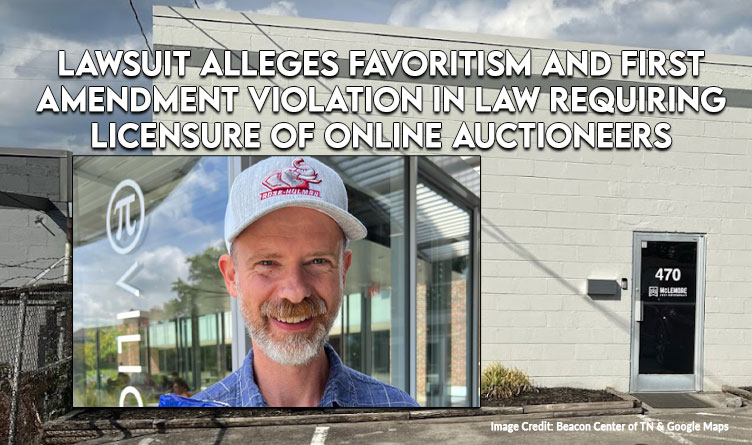Image: Will McLemore Image Credit: Beacon Center of TN & Google Maps
The Tennessee Conservative Staff –
The Beacon Center of Tennessee has filed a lawsuit on behalf of auctioneers, arguing that a 2019 law requiring online auctioneers to be licensed is a violation of their First Amendment rights.
“This law makes it illegal for them to conduct online auctions without a license,” Beacon Director of Legal Affairs Wen Fa said. “All they want is to earn an honest living and continue to speak — and to use their speech, exactly as the First Amendment protects.”

The group is representing Will McLemore and his employees at McLemore Auction Company, located in Nashville, along with three other plaintiffs including unlicensed online auctioneers Blake Kimball, Ron Brajkovich, and Justin Smith, all of which have worked reliably with McLemore and established important relationships with McLemore Auction Company’s customers, according to The Beacon Center.
According to Beacon, the law violates the First Amendment because speaking is a critical part of auctioneering.
“Any burden on speech is a burden on the First Amendment,” said Fa. “And it’s impossible to conduct auctions without communications — so the law directly implicates speech, and it’s not right to limit that.”
The law changes the way things had been previously for online auctioneers. As online auctions became more popular in 2006, auctioneers who used the platform did not have to have an auctioneer’s license. However, in 2019, the new law required that auctioneers who worked extended time would have to be licensed.

The court initially ruled in McLemore’s favor by granting preliminary and permanent injunctions against the law, stating that the law violated the Commerce Clause. The U.S. 6th Circuit Court of Appeals, however, reversed the decision recently, dismissing the case without any discussion of the plaintiffs’ First Amendment claim.
Larger auction groups, like eBay, are exempted from the state law, which Beacon says is discriminatory.
“There’s significant evidence of political favoritism here,” Fa said. “Some legislators even called it ‘the eBay exception.’”
The 2019 law’s exception for churches is also problematic, according to Beacon.
“The law exempts churches. Since the dictionary defines ‘church’ to mean ‘a building for public Christian worship,’ Random House Webster’s College Dictionary (1991), it means that synagogues and mosques do not have the same equal treatment,” Beacon states on their website. “The law also exempts governmental entities and the University of Tennessee. None of these specified carve-outs have any valid basis.”

The vice president of strategy and communications at Beacon, Mike Cunningham, says the law is “pure cronyism.”
“It’s a real cronyism issue here,” he said. “Because there’s been no issue with online auctioneers. It’s purely to protect traditional auctioneers (over online).”
Fa called it “unconstitutional.”
“We filed this lawsuit because countless Americans, from web designers to tour guides to authors, make their living by speaking,” he said. “The right to earn a living is fundamental. The fact is that this law is arbitrary, unfair, and quite frankly unconstitutional. Professional speech is not any less worthy of First Amendment protection merely because the speaker is earning a living in the process.”



